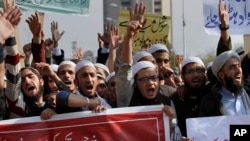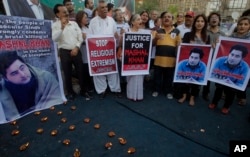Pakistan's government is pushing ahead with its anti-blasphemy campaign, which critics claim is really an attempt to quash dissent and intimidate opponents.
The Pakistan Telecommunication Authority, the government-run communications regulatory agency, has sent text messages to millions of mobile phone subscribers, warning them against sharing or uploading "blasphemous" content online. The same message was posted on its website.
"Uploading and sharing of blasphemous content on the internet is a punishable offense under the law," the message says in Urdu. "Such content should be reported on info@pta.gov.pk for legal action."
The government, reflecting a growing conservative movement in the overwhelmingly Muslim country, has been pushing for tight enforcement of blasphemy legislation, even seeking assistance from internet providers such as Google to delete such content.
Critics claim the real target is silencing dissent that has flourished online on everything from politics and the military to freedom of speech and women's rights. Being labeled as "blasphemous" in Pakistan can make a person the target of violence.
Farhan Hussain from Bytes for All, a digital rights organization, worried about the impact of the government's warning.
"This kind of message to mobile users may fuel hatred in society," Hussain told VOA. "By doing this, in fact, the issue was further highlighted."
A university journalism student was recently beaten and shot to death by an angry mob over allegations that he had posted blasphemous content on social media. An investigation later found the allegations to be false, and the attack sparked protests against the law.
Pakistani lawyer Asma Jahangir, spokeswoman for the Pakistan Human Rights Commission, questioned why the message was issued.
"There are 95 percent Muslims in the country, and the other 5 percent non-Muslims have no interest in blasphemy," Jahangir said. "The PTA's message is not understandable, and I do not know why it feels every person is committing blasphemy."














